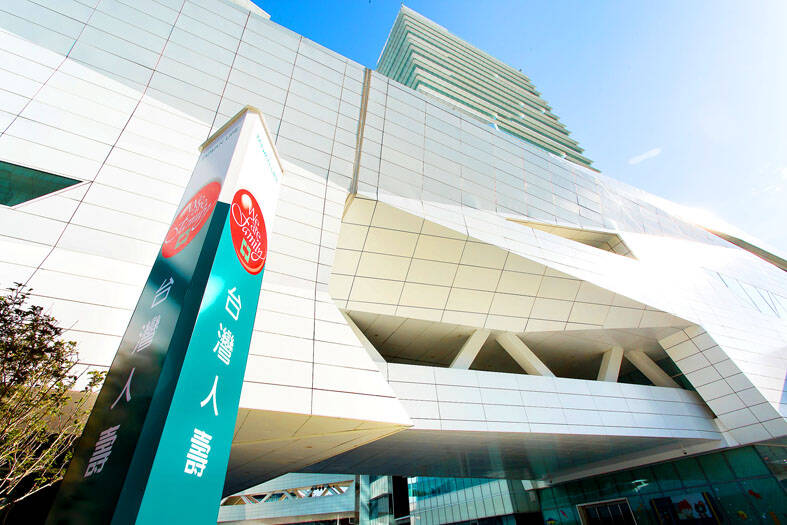CTBC Financial Holding Co (中信金控) yesterday said it has sufficient funds to pay cash dividends after booking unrealized losses of NT$90 billion (US$2.89 billion) from its life insurance arm, Taiwan Life Insurance Co (台灣人壽), thanks to strong profit growth from its banking unit CTBC Bank (中信銀行).
CTBC Bank is expected to post record net profit this year, CTBC Financial Holding president James Chen (陳佳文) told an investors’ conference.
In the first three quarters of this year, CTBC Bank’s net profits expanded 26.5 percent year-on-year to NT$28.9 billion, making up 90 percent of all net profits of the conglomerate, corporate data showed.

Photo courtesy of CTBC Financial Holding Co
Taiwan Life’s net profits plunged 77 percent annually to NT$5.15 billion due to compensation paid to COVID-19 insurance policy holders and an unrealized investment loss of NT$90 billion amid tumbling stock markets and volatile foreign exchange rates of the New Taiwan dollar versus the US dollar.
Asked about how the decline in net profit would affect CTBC Financial Holding’s cash dividend policy next year, Chen said that the company is seeking to pay out a dividend each year.
“Cash dividend distribution is still possible next year, although Taiwan Life might not be able to contribute significant earnings to the parent company,” Chen said.
“We mostly rely on the net earnings made by CTBC Bank to pay cash dividends. The bank performs quite well this year,” Chen said. “Moreover, CTBC Financial itself has accumulated retained earnings totaling about NT$100 billion, which could also be used for cash dividend distribution.”
CTBC Bank reported an annual net interest income increase of 26 percent to NT$19 billion last quarter, offsetting mild drops in its net fee income and investment returns, the data showed.
For the first three quarters of this year, the bank’s lending grew 17 percent to NT$3.12 trillion, with loans denominated in foreign currencies by its overseas units growing 27 percent from a year earlier, the most significant growth among its segments, the data showed.
Net interest margin, a common profit gauge for banks, last quarter continued to climb to 1.62 percent, up from 1.39 percent a year earlier, thanks to rate hikes by the central bank, the data showed.
Taiwan Life, the parent company of CTBC Insurance Co (中國信託產險), as of the end of September had set aside NT$14.3 billion to compensate policyholders of its COVID-19 insurance, which caused the life insurer’s profits to decline from a year earlier, it said.
However, Chen said COVID-19-related payments have nearly come to an end, and Taiwan Life has kept a satisfactory capital adequacy so far.
The life insurer does not have to raise fresh capital, he said.

NEW IDENTITY: Known for its software, India has expanded into hardware, with its semiconductor industry growing from US$38bn in 2023 to US$45bn to US$50bn India on Saturday inaugurated its first semiconductor assembly and test facility, a milestone in the government’s push to reduce dependence on foreign chipmakers and stake a claim in a sector dominated by China. Indian Prime Minister Narendra Modi opened US firm Micron Technology Inc’s semiconductor assembly, test and packaging unit in his home state of Gujarat, hailing the “dawn of a new era” for India’s technology ambitions. “When young Indians look back in the future, they will see this decade as the turning point in our tech future,” Modi told the event, which was broadcast on his YouTube channel. The plant would convert

‘SEISMIC SHIFT’: The researcher forecast there would be about 1.1 billion mobile shipments this year, down from 1.26 billion the prior year and erasing years of gains The global smartphone market is expected to contract 12.9 percent this year due to the unprecedented memorychip shortage, marking “a crisis like no other,” researcher International Data Corp (IDC) said. The new forecast, a dramatic revision down from earlier estimates, gives the latest accounting of the ongoing memory crunch that is affecting every corner of the electronics industry. The demand for advanced memory to power artificial intelligence (AI) tasks has drained global supply until well into next year and jeopardizes the business model of many smartphone makers. IDC forecast about 1.1 billion mobile shipments this year, down from 1.26 billion the prior

People stand in a Pokemon store in Tokyo on Thursday. One of the world highest-grossing franchises is celebrated its 30th anniversary yesterday.

Zimbabwe’s ban on raw lithium exports is forcing Chinese miners to rethink their strategy, speeding up plans to process the metal locally instead of shipping it to China’s vast rechargeable battery industry. The country is Africa’s largest lithium producer and has one of the world’s largest reserves, according to the US Geological Survey (USGS). Zimbabwe already banned the export of lithium ore in 2022 and last year announced it would halt exports of lithium concentrates from January next year. However, on Wednesday it imposed the ban with immediate effect, leaving unclear what the lithium mining sector would do in the